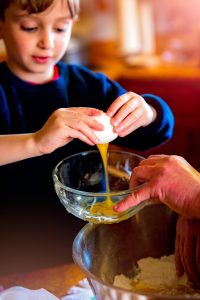We Wish You a Very Happy, Healthy, and Safe Holiday Season
By Sharon Pinard-Sisle, RDN, CDCES

Keep meat, poultry, seafood, and eggs separate from your other foods from grocery store to your refrigerator. Seal these foods properly so the juices from them do not leak on other foods.
The most common symptoms of food poisoning are diarrhea, stomach pain or cramping, nausea, vomiting or fever. In more severe cases, food poisoning can cause bloody diarrhea, high fever, and prolonged nausea and vomiting that can cause dehydration. Most often people will get a mild case of foodborne illness and the symptoms go away within a few days, however there are instances where the food poison can cause brain damage, kidney failure, and even death.
The good news is that food poisoning is preventable. Here is what you can do to protect family and friends from getting sick from the food at your holiday gathering and always.
- Keep meat, poultry, seafood, and eggs separate from your other foods from grocery store to your refrigerator. Seal these foods properly so the juices from them do not leak on other foods.
- Cook high risk foods to appropriate internal temperatures. Visit the cdc.org for a chart on safe temperatures as well as how and when to test temperatures. Generally beef and fish need an internal temperature of 145°F and chicken and pork have to be cooked to an internal temperature of 165°F.
- Keep hot food hot and cold food cold. Food can only be in the danger zone of 40°F to 140°F for 2 hours. After two hours it needs to be refrigerated or frozen and then cannot be left out again in the danger zone. Although it’s nice to sit around the table for hours and have the food there for all of that time, it is important to serve the food and then put it away after serving so it doesn’t become a breeding ground for dangerous germs.
- Always use pasteurized eggs for dishes that contain raw egg like egg nog.
- Raw flour can have harmful germs so be sure to cook pastries, biscuits, breads etc. appropriately and sufficiently.
- Thaw turkey safely. Again check out cdc.gov for information on safe thawing. Do not thaw turkey or other high risk foods on the counter or they will be in the danger zone for too long.
- Wash your hands, wash your hands, wash your hands. Use soap and water. At a minimum, hands have to be washed before and after preparing food, before and after eating, after feeding pets, after anything to do with the toilet or diapers, after touching garbage, after sneezing, coughing, or caring for someone who is ill. There is always a good reason to wash your hands!
The holidays can be such a joyous time to gather with loved ones and to enjoy cherished family recipes. With some simple steps, you can also be sure to enjoy the holidays without anyone getting sick from the food.
